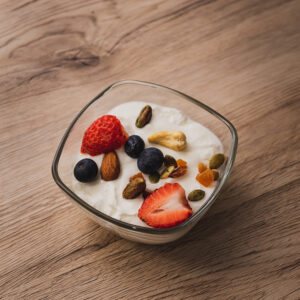Is Yogurt Good For You?
 Traditionally, yogurt is a milk product made through a process called fermentation. Dairy yogurts may contain an abundance of live microorganisms called probiotics which are healthy bacteria for your gut! Probiotics are very beneficial to your health in many ways including maintaining a healthy digestive tract and immune system.
Traditionally, yogurt is a milk product made through a process called fermentation. Dairy yogurts may contain an abundance of live microorganisms called probiotics which are healthy bacteria for your gut! Probiotics are very beneficial to your health in many ways including maintaining a healthy digestive tract and immune system.
Yogurts come in a variety of flavors, colors, and textures. A typical myth that you may have heard is that all yogurt is healthy! While yogurt can be packed with vitamins, minerals, protein, and healthy fats, not all yogurts are created equally. In fact, a lot of yogurts out there are packed with added sugar which comes from add-ins like fruit-flavored syrup, other sweet flavorings, candies, and cookies. In short, yes, yogurt is healthy, but what is added to it can turn it from a healthy meal or snack into a dessert.
Sugar
Some people believe that all sugar is bad for you, but this is false! All dairy products have naturally occurring sugars in them. This natural sugar is something you may have heard of before, called lactose. Typically, 1 cup of plain yogurt will contain about 11 grams of natural sugar (lactose). This small amount of natural sugar is not something to be worried about. Try to pick yogurts that have about 11 grams of sugar, since anything more than this is added sugar. Current nutrition labels include two lines for sugar. The first line labeled “Total Sugars” is the total amount, expressed in grams, of both natural and added sugars per serving. The second line labeled “Added Sugars” is the total amount of sugar added into the food product. To figure out the total amount of natural sugars, simply subtract “Added Sugars” from “Total Sugars.”
Example:
- Dannon “Fruit On The Bottom” blueberry flavored yogurt has 21g sugar including 10g added sugar
- 1 cup plain yogurt with ¼ cup blueberries mixed in has 15g sugar including 0g added sugar
Protein
Usually yogurt is a great source of protein, but the amount of protein depends on the type and style you buy. Regular and greek yogurt are the most popular yogurts. A greek style yogurt will be thicker in texture and have more protein than regular yogurt. Typically, 1 cup of plain greek yogurt contains 25 g of protein compared to about 9 g of protein in 1 cup of regular yogurt. Try to pick yogurts with a higher amount of protein since they will keep you full for longer.
What is the difference between Lactose-free and Dairy-free?
Lactose is a naturally occurring sugar in milk. However, those who are lactose intolerant cannot eat or drink lactose because it makes them sick. Thankfully, there is technology that is able to remove lactose from milk which makes it “lactose-free” so that even those who are intolerant can enjoy it. However, this yogurt is still made with cow’s milk, making it a dairy product so is not appropriate for people with a dairy allergy or who follow a dairy-free diet.
Dairy-free means the yogurt contains neither cow’s milk or lactose. These yogurts are made from plants and nuts. Some examples include:
- Almond milk yogurt
- Coconut milk yogurt
- Cashew milk yogurt
- Soy milk yogurt
- Oat milk yogurt
Currently there are tons of dairy-free and lactose-free yogurt options available. However, when choosing dairy-free options, additional considerations to be aware of are that typically these products are lower in protein, but higher in added sugars.
¾ cup Chobani vanilla greek yogurt
|
¾ cup So Delicious coconut vanilla yogurt
|
Flavor
It can be hard to switch from a high-sugar yogurt to one only containing natural sugars. This can change the flavor and might be too tart for some people. However, there are lots of options for you to add into your yogurt to bring back flavor and make it delicious!
Consider mixing in: raw honey, pure maple syrup, fresh fruit, granola, vanilla-extract, coconut flakes, chocolate chips, nut butter (peanut, almond, cashew, ect), nuts, and/or seeds.
Recipe Ideas
Greek Yogurt Parfait
Put 1/4 cup of plain greek yogurt into a cup. Add a few tablespoons of your favorite toppings (example: fresh fruit, granola, coconut flakes, chocolate chips, nuts, and/or seeds). Add another 1/4 cup of plain plain greek yogurt on top. Finish by topping off with honey or maple syrup and a few more tablespoons of your toppings.
Smoothie
Blend together 1 cup plain greek, a splash of orange juice, a handful of fresh/frozen fruit, and a drizzle of honey. Top with additional toppings if desired.
-Nutrition student Marissa

